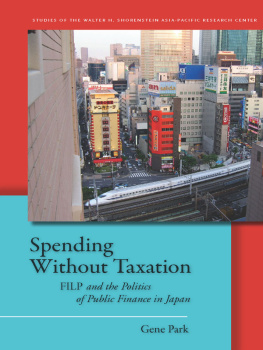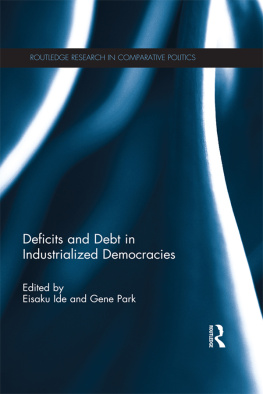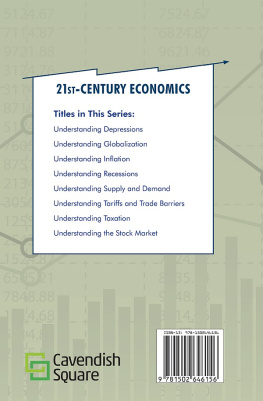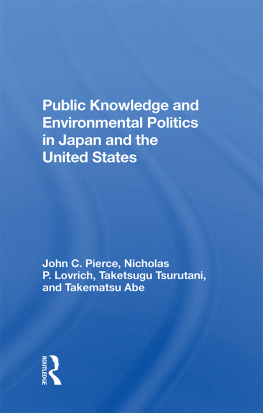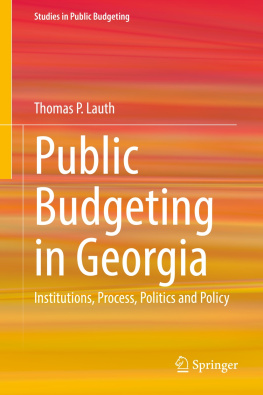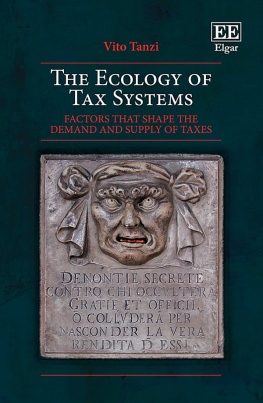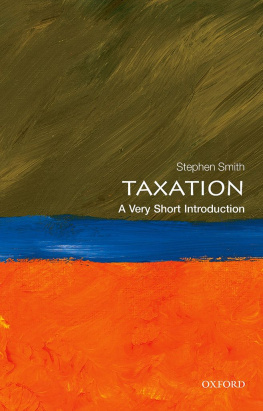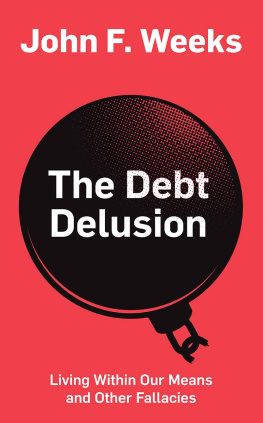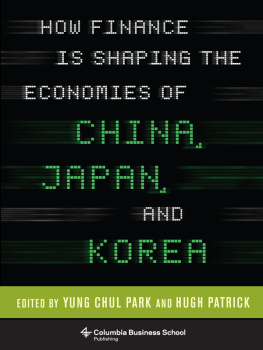Spending without Taxation
Studies of the Walter H. Shorenstein Asia-Pacific Research Center
Andrew G. Walder, General Editor
The Walter H. Shorenstein Asia-Pacific Research Center in the Freeman Spogli Institute for International Studies at Stanford University sponsors interdisciplinary research on the politics, economies, and societies of contemporary Asia. This monograph series features academic and policy-oriented research by Stanford faculty and other scholars associated with the Center.
ALSO PUBLISHED IN THE
SHORENSTEIN ASIA-PACIFIC RESEARCH CENTER SERIES
One Alliance, Two Lenses: U.S.-Korea Relations in a New Era
Gi-Wook Shin (2010)
Collective Resistance in China: Why Popular Protests Succeed or Fail
Yongshun Cai (2010)
The Chinese Cultural Revolution as History
Edited by Joseph W. Esherick, Paul G. Pickowicz, and Andrew G. Walder (2006)
Ethnic Nationalism in Korea: Genealogy, Politics, and Legacy
Gi-Wook Shin (2006)
Prospects for Peace in South Asia
Edited by Rafiq Dossani and Henry S. Rowen (2005)
Spending without Taxation
FILP AND THE POLITICS
OF PUBLIC FINANCE IN JAPAN
Gene Park
Stanford University Press
Stanford, California
2011 by the Board of Trustees of the Leland Stanford Junior University.
All rights reserved.
No part of this book may be reproduced or transmitted in any form or by any means, electronic or mechanical, including photocopying and recording, or in any information storage or retrieval system without the prior written permission of Stanford University Press.
Printed in the United States of America on acid-free, archival-quality paper
Library of Congress Cataloging-in-Publication Data
Park, Gene, author.
Spending without taxation : FILP and the politics of public finance in Japan / Gene Park.
pages cm. (Studies of the Walter H. Shorenstein Asia-Pacific Research Center)
Includes bibliographical references and index.
ISBN 978-0-8047-7330-0 (cloth : alk. paper)
1. Fiscal policyJapanHistory. 2. Finance, PublicJapanHistory. 3. JapanAppropriations and expendituresHistory. 4. TaxationJapanHistory. 5. JapanPolitics and government1945 I. Title. II. Series: Studies of the Walter H. Shorenstein Asia-Pacific Research Center.
HJ1394.P37 2011
336.52dc22 2010043067
Typeset by Thompson Type in 11/14 Adobe Garamond
E-book ISBN: 978-0-8047-7766-7
Figures and Tables
Figures
6.9 TFBF and Postal
Savings Share of New Government Bond Issues, 19701990
6.10 TFBF and Postal
Savings Purchase of Government Bonds, 19701990
Tables
Acknowledgments
In completing this project, I have incurred many debts to people and institutions that were critical to making it possible. I owe the greatest debt to my former advisors at Berkeley, who helped shape and guide the project from its inception. I initially went to Berkeley to work with Steven Vogel, who provided intellectual guidance and support from my first day of graduate school. I had the great fortune to work with Jonah Levy and T. J. Pempel, who generously read numerous drafts and shaped my ideas at critical junctures. Jonah first suggested the title of this book, which nicely captures the essence of the project. Kevin OBrien and AnnaLee Saxenian provided advice in the early stages of the project.
I am also appreciative of the many people who helped me with my research. Many individuals in Japan generously offered their time. This work would not have been possible without the many interviews and meetings I had with numerous government officials. Kagehide Kaku provided several key introductions. Mao Guirong helped me navigate the Japanese literature. Iris Hui offered helpful advice on my statistical analysis. Many others provided input at various stages, including John Ciorciari, Eisaku Ide, and Ed Fogarty. The anonymous reviewers will notice the significant contribution they made in improving the manuscript. This project would not have been possible without institutional and financial support. Thanks to Fulbright IIE I was able to spend more than a year in Japan conducting research. The Blakemore Foundation funded my language training. The Japanese Ministry of Finances Policy Research Institute (PRI) hosted me for two years. I am very grateful to the Shorenstein Asia-Pacific Research Center (APARC) at Stanford University for providing funding and a very congenial environment to work on my project.
Finally, I would like to thank my family. My parents have always encouraged me to pursue my intellectual interests, and my brother has been a great lifelong friend. Emily Chung made the last several years very happy ones, and she is also a great editor.
Spending without Taxation
ONE
Introduction
Everyone likes spending, although no one likes to pay. Governments are the same. While they would like to deliver popular goods and benefits to voters, paying for such spending requires unpleasant choices, levying taxes or running budget deficits. Because they cannot have high spending, low taxes, and balanced budgets, they have to make difficult political choices. Governments, thus, face a fiscal trilemma. But what would happen if a government found a means of spending without taxation? This book contends that this is precisely what Japan did. The ruling party, the Liberal Democratic Party (LDP), used a system of public finance that did not rely on taxesthe Fiscal Investment Loan Program (FILP)and allowed it to do the seemingly impossible: keep taxes low and budgets balanced, all without having to restrain public spending. This combination was at the core of a distinctive postwar political bargain: one that eschewed high budget spending and taxation, expansion of the welfare state, and Keynesian-inspired fiscal stimulus. By doing so, though, it was striking a Faustian bargain that eventually undermined the political settlement that it helped underwrite.
By focusing on FILP, this study presents several novel findings. First, it demonstrates that a financial mechanism, FILP, enabled the Japanese government to run a distinctive neoclassical fiscal policy based on low budget spending from the end of the 1940s through 1970. This ran directly counter to the postwar trend in other industrial democracies, where governments increased budget spending and taxation to finance the expansion of the welfare state and in many cases employed fiscal stimulus to maintain full employment. Second, it shows that the governments policy of budget restraint and pork barrel spending were two sides of the FILP coin. This finding resolves the contradiction between the view that the LDP has stayed in power through profligate public spending and the reality of low budget spending in Japan. Third, this study reveals that, while the governments early commitment to budget restraint initially delivered economic benefits, it came at a very high long-term cost: heavy state intervention in finance, deferred fiscal burden, and the political challenge of reforming the mechanism that made it all possible.
In comparative perspective, the Japanese case illustrates a larger point about the politics of public spending. While most comparative studies focus on budget spending, taxation, and budget deficits, the experience of Japan demonstrates that governments can finance their activities not only through taxes but also through the allocation of



